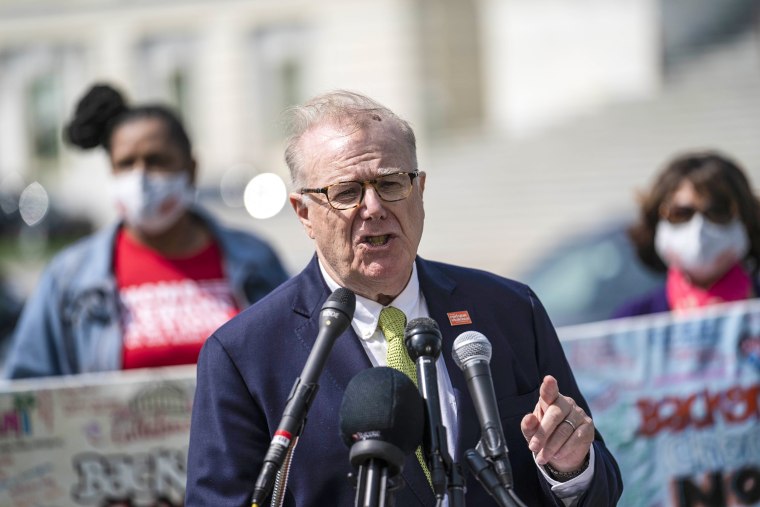The Senate is on the verge of passing a bipartisan package of gun reforms in response to mass shootings in Texas, New York, and elsewhere after decades of failures.
The framework falls short of previous bills that gun safety groups championed over the last two decades, which sought to make background checks universal and renew bans on assault weapons. But leading advocacy groups are already hailing the move as a potential breakthrough, even with no legislative text and some significant last-second hurdles to clear in negotiations.
John Feinblatt, president of Everytown For Gun Safety, is one of those activists backing the bill. We spoke to him on Wednesday about what's in the framework, how it might help, and why he thinks Democrats should accept a compromise. Here is some of that discussion, edited for length and style:
Q: It’s been 10 years since Sandy Hook, which was 13 years after Columbine, which led to its own failed push for gun legislation. What is different this time?
Feinblatt: I think the American public is just fed up.
Q: Tell me about the real world impact of breaking that logjam. Are there provisions in this bill that you think will actually save lives?
Feinblatt: Without a doubt. I’ll give you sort of a top three that stand out for me.
The first would be implementing and incentivizing the Red Flag laws. The tragedy in Buffalo was a textbook case for a Red Flag law, the problem was nobody took that tool out of the toolbox. New York State has a strong Red Flag law that could have been used in that case and would have likely saved lives.
What’s important about this bill is it’s going to incentivize states that currently have Red Flag laws to do training. It’s really important to educate people about laws, and particularly in the case of a Red Flag law, because it can be triggered not just by law enforcement, but it can be triggered by family members and, in the case of New York State, it can be triggered by school officials. That takes training. So this is important. This can save lives. There’s no question about it.
I would also talk about the provisions to disarm domestic abusers, because the truth is that the current federal law couldn’t be more anachronistic.
Many states have updated their laws to conform to current customs and current family constellations. The federal government hasn’t.
The other provision that I would point out is in both Uvalde and in Buffalo, we were dealing with 18 year olds. And what this does is it provides for an enhanced background check, and a period to investigate, whenever anybody under 21 tries to buy a long gun, which includes an assault weapon.
Q: The framework includes money for school safety, although the details are a little vague right now. What’s your understanding of where those resources are likely to go?
Feinblatt: I think that it’s important to use them for training, it’s important to enhance the psychological services that are available within schools, it’s important to enhance what I would call education, which comes down to, if you see something, say something, which is really another way of describing a Red Flag law. So there are all sorts of ways that you can provide safer school settings, besides Ted Cruz’s suggestion of only having one exit and entrance door.
Q: One risk for Democrats with these talks is that, by allowing Republicans to say they’ve done something on guns, they’ll release the pressure to pass more significant legislation that you support, like universal background checks or a ban on assault weapons. What would you say to people who share that concern?
Feinblatt: In fact, just the opposite is true. The problem with this issue is it’s so intensely politicized. And now we’re at a moment where a piece of legislation is going to be passed with large bipartisan support. What that will do is signal to other elected officials that this is not a political issue, it’s a public health issue, and that you will find more people willing to actually take the next step, whether it be at the federal level, the state level, or the city level.
Q: Does it affect things at all that the NRA seems to be at such a low point? They’ve been dealing with a lot of internal problems, do you feel like that’s had any influence on the negotiations?
Feinblatt: The NRA is spending one in five dollars on lawsuits. I think what they’re preoccupied with is survival, not with influencing what’s going on in Congress.
Q: Do you think there’s still a significant chance this might fail at the finish line here? How confident are you that this will pass?
Feinblatt: I am pretty confident it will pass. We’ve got 10 Republicans, 10 Democrats that have already signed on to the framework, we’ve got Mitch McConnell signaling that he can support the framework. I think that nothing happened after Sandy Hook, nothing happened after Columbine, nothing happened after Las Vegas, nothing happened after Parkland. This is the moment this is going to happen.

